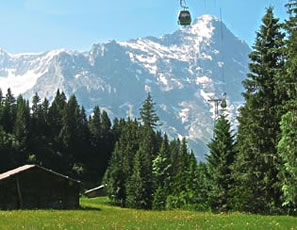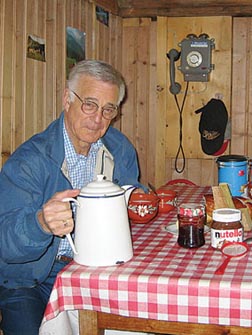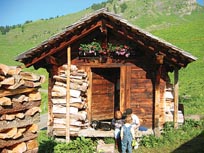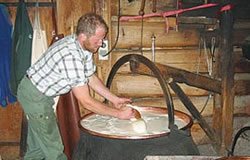
Have you ever loved a place so much you felt it was truly yours, and that when you were gone it ceased to exist, like a Swiss music box that opens and plays for your delight when you arrive, then closes when you depart? I know such a place.
It's Grindelwald, a village in the Swiss Alps. The name is from grindel, an old German-Celtic word that means a block of wood used as a barrier; and wald, which means forest. The word, perhaps, means a forested place blocked off from the rest of the world. Famous mountain peaks, including Mönch, Schreckhorn, Wetterhorn, Jungfrau, and the climbers' mecca, Eiger, envelop Grindelwald, which lies in a verdant valley where spring flowers — edelweiss, gentian, daisies, cowslip — outnumber blades of grass.
I was 14 when I first
traveled to Grindelwald from my home in Johannesburg, South Africa.  I
stayed in a youth hostel, sleeping on a lumpy mattress and shaving with
ice water. But I was instantly smitten. The night sky was the darkest
I'd ever seen: black satin, studded with stars. I can remember kneeling
at the window, wondering where the mountains ended and the sky began.
I would try to figure out which were the lights in the mountain
huts, occupied by climbers, and which were stars.
I
stayed in a youth hostel, sleeping on a lumpy mattress and shaving with
ice water. But I was instantly smitten. The night sky was the darkest
I'd ever seen: black satin, studded with stars. I can remember kneeling
at the window, wondering where the mountains ended and the sky began.
I would try to figure out which were the lights in the mountain
huts, occupied by climbers, and which were stars.
After I married, I
brought my wife, Alana, here to visit. She became as enamored of the place
as I. In the years since, we've come back many times, bringing our three
children, now grown.
 Last June, after an absence of five years, we returned to Grindelwald
for a five-day stay. I realized that, during the half-century since I
first discovered this special place, I have changed far more than it has.
The charm of the village and the diversity of its nearby excursions are
as alluring as ever.
Last June, after an absence of five years, we returned to Grindelwald
for a five-day stay. I realized that, during the half-century since I
first discovered this special place, I have changed far more than it has.
The charm of the village and the diversity of its nearby excursions are
as alluring as ever.
After flying into
Zurich, we traveled to Interlaken and changed to the cogwheel train that
winds up to Grindelwald. Through the open windows, we gulped air that
felt like the first crisp bite of a pippin apple. With the sun's rays
dancing through clouds, we easily recognized the town's little shadow-box
houses.  As
we arrived, the foehn, the local wind, was blowing, raising the powder
snow that permanently covers the surrounding mountaintops, which reach
as high as 13,000 feet.
As
we arrived, the foehn, the local wind, was blowing, raising the powder
snow that permanently covers the surrounding mountaintops, which reach
as high as 13,000 feet.
The whole length of the town center is perhaps half a mile: one street, with country lanes that lead off into the hills or up to the foot of the mountains. The chalets look like life-size Swiss music boxes: Carved wooden forms trim the rooftops, and geranium-filled flowerboxes decorate the balconies. During yearly competitions, prize cattle are brought into the town square, alongside the 105-year-old Grand Hotel Regina.
This visit, we stayed at the Regina, which is far different from the modest hostel I occupied as a teenager. With its spires and turrets, the Regina looks as though it could have been designed by and for Queen Victoria. The staff spoiled us with service. Some mornings we'd sit on our balcony and linger over a breakfast of muesli, the freshest of eggs, and croissants still warm from the oven, as we gazed at the Eiger. Days began with the sounds of cowbells and church bells, the splashing of many a waterfall fed by melting snow, and the smell of smoke rising from a hundred chimneys. It didn't take us long to feel at home.
From Grindelwald, you can take wonderful day trips. Some of the nearby ski lifts operate throughout the year to take you to restaurants on mountain peaks for good hearty food: schnitzels, bratwurst, pomme frites, raclette, and fondues. Then you descend on foot, via winding paths, where every turn offers stunning views. Nothing is hurried.
One day we rode the Firstbahn, a lift with six-seat gondolas that takes people over the rooftops of town, across the hillocks and fir trees, and up to the peak called First. We got off the lift at Bort, partway up, and took the easy hike to Bachalpsee, the small lake that reflects, mirrorlike, several of the grandest Alps: Schreckhorn, Finsteraarhorn, and Wetterhorn.
Another day, we took
a daylong train excursion to the highest railroad station in Europe, the
Jungfraujoch, traveling first to the Kleine Scheidegg Railway Station,
then changing to Jungfrau Railways.  The
train pushed through mountain tunnels and stopped at places overlooking
the longest river of ice in the Alps — the nearly 15-mile-long Aletsch
Glacier. After disembarking at the Jungfraujoch, we entered the Ice Palace.
Inside this series of tunnels that burrow into the mountain, artists have
carved amazing ice sculptures. Because temperatures here never go above
freezing, some of these creations have lasted for years; on this trip,
we saw a vintage motorcar, chiseled from ice, that I remembered seeing
as a schoolboy.
The
train pushed through mountain tunnels and stopped at places overlooking
the longest river of ice in the Alps — the nearly 15-mile-long Aletsch
Glacier. After disembarking at the Jungfraujoch, we entered the Ice Palace.
Inside this series of tunnels that burrow into the mountain, artists have
carved amazing ice sculptures. Because temperatures here never go above
freezing, some of these creations have lasted for years; on this trip,
we saw a vintage motorcar, chiseled from ice, that I remembered seeing
as a schoolboy.
Perhaps our most satisfying adventure was the 20-minute drive up Bussalp Mountain to visit a hut where farmer Andreas Miechel was making cheese the old-fashioned way. Twenty minutes to turn the clock back 300 years. The sun had just risen by the time Miechel had milked the 22 cows he lives with under the same roof. We watched as he poured the fresh milk into a large copper cauldron and warmed it to a precise temperature over a log fire, stirring constantly. He separated the whey from the curd of the curdled milk, first with a large wooden ladle and then with a tool that resembled a harp. Over three hours, he turned milk into enormous wheels of cheese.
Miechel took a break
from his duties to share breakfast with us: breads fresh from the oven,
hunks of pungently aromatic cheese, and coffee that tasted as rich as
it smelled.  We
stayed until the newly made wheels of cheese were ready to be put into
storage. They'll taste good two years from now, outstanding four years
from now, and in seven, superb. A perfect reason for Alana and me to return
to Grindelwald and replay its sweet harmonies.
We
stayed until the newly made wheels of cheese were ready to be put into
storage. They'll taste good two years from now, outstanding four years
from now, and in seven, superb. A perfect reason for Alana and me to return
to Grindelwald and replay its sweet harmonies.
Have you ever loved a place so much that you compared it to a music box that opens for your delight when you arrive and closes when you depart? This is such a place.
Story and Photographs by Michael Jackson
As seen in Westways (Jan/Feb 2003) the member publication of the Automobile Club of Southern California.
